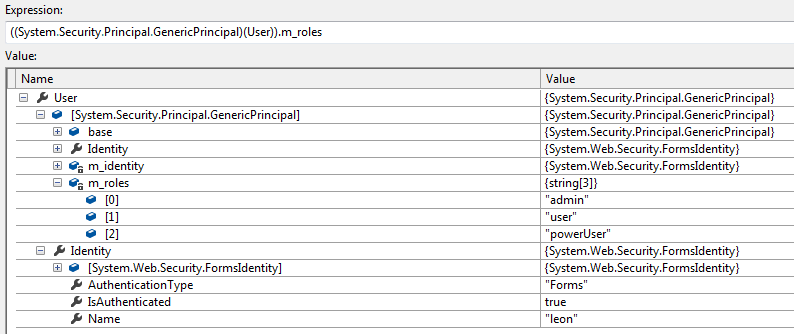给Asp.net MVC Forms 验证设置角色访问控制
当我们使用Asp.net MVC Forms方式验证用户, 然后设置Controller 或 Action 的 Authorize属性时, 默认情况下只有Users属性可以设置(这里的Users通常是指用户登录名), 我们无法直接设置用户的角色信息 , 当建立一个依赖角色的应用时(又不想麻烦配置Membership),我们有必要给认证用户加上角色信息,下面是具体方法 :
1.Web.config 配置 ,以下设置标明我们使用Forms验证
<authentication mode="Forms"> <forms loginUrl="~/Account/LogIn" timeout="30" slidingExpiration="true" cookieless="UseCookies" path="/" name=".MYASPXAUTH" /> </authentication> <!--<authorization> <deny users="?"/> </authorization>-->
具体配置参考:http://msdn.microsoft.com/zh-cn/library/1d3t3c61(v=vs.100).aspx
<forms name="name" loginUrl="URL" defaultUrl="URL" protection="[All|None|Encryption|Validation]" timeout="[MM]" path="path" requireSSL="[true|false]" slidingExpiration="[true|false]"> enableCrossAppRedirects="[true|false]" cookieless="[UseUri|UseCookies|AutoDetect|UseDeviceProfile]" domain="domain name" ticketCompatibilityMode="[Framework20|Framework40]"> <credentials>...</credentials> </forms>
slidingExpiration:是否滑动过期,应设置为true
name属性:如果服务器有多个应用程序,每个应用程序的name属性应不同。
上面代码注释掉了deny 设置,如果设置了上面的项,则所有页面都需要用户登录。注释掉之后,只在访问在Controller或Action上面设置了验证用户或角色的页面时,才提示登录。
2 Global.asax.cs 添加验证请求事件代码 ,如果用户信息已经设置, 则重新构造带角色信息的用户对象 , 角色信息从身份凭证票据的UserData属性中获取,多个角色以逗号隔开。
protected void Application_AuthenticateRequest(object sender, EventArgs e) { var app = sender as HttpApplication; if (app.Context.User != null) { var user = app.Context.User; var identity = user.Identity as FormsIdentity; // We could explicitly construct an Principal object with roles info using System.Security.Principal.GenericPrincipal var principalWithRoles = new GenericPrincipal(identity, identity.Ticket.UserData.Split(',')); // Replace the user object app.Context.User = principalWithRoles; } }
上面代码是Asp.net请求管道中的一个环节,每次请求时都会执行。
如果UserData中还想保存其它数据,需要使用其它分隔符进行分割并处理。
这种方式主要用于系统功能简单,角色较少的应用。
经过上面角色的转换,系统就可以直接使用内部定义的验证方式进行验证了。

3.用户合法性验证通过后, 构造带角色信息的加密身份凭据 , 角色信息存储在票据的UserData中。
[HttpPost] public ActionResult LogOn(User user) { // check user by quering database or other ways. skip this logic. string userRoles = "admin,user,powerUser"; bool isPersistent = false; int version = 0; double persistentMinutes = 30.00; // minutes string userName = user.Name; string cookiePath = FormsAuthentication.FormsCookiePath; FormsAuthenticationTicket ticket = new FormsAuthenticationTicket(version, userName, DateTime.Now, DateTime.Now.AddMinutes(persistentMinutes), isPersistent, userRoles, cookiePath); string encryptedTicket = FormsAuthentication.Encrypt(ticket); HttpCookie cookie = new HttpCookie(FormsAuthentication.FormsCookieName, encryptedTicket); Response.Cookies.Add(cookie); return Redirect(Request.QueryString["returnUrl"]); }
isPersistent:是否将cookie持久化保存到客户端硬盘。一般应该选择false,即每次访问都要登录。但可以将用户名保存到客户端,用户登录时直接取得并设为默认。
HttpCookie userNmaecook=new HttpCookie("MyAppUserName",userName); vljidcook.Expires=DateTime.Now.AddDays(200); this.Context.Response.Cookies.Add(userNmaecook);
4. 使用角色信息控制用户对Controller 或 Action 的访问 , 因为我们上面设置用户拥有admin , user , powerUser 角色, 所以用户有权访问此方法
public class HomeController : Controller { [Authorize(Roles="admin,powerUser")] public ActionResult Index() { //用户拥有 admin,user,powerUser 角色, 所以可以访问此方法。 return View(); } }
一般权限应按ontroller设置,后台管理和前台浏览使用不同的controller。
5. 以下是AuthorizeAttribute AuthorizeCore方法的源码 , 我们可以看到其中只要用户有AuthorizeAttribute.Roles设置中的任意角色, 就可以通过AuthorizeAttribute 的审核
// This method must be thread-safe since it is called by the thread-safe OnCacheAuthorization() method. protected virtual bool AuthorizeCore(HttpContextBase httpContext) { if (httpContext == null) { throw new ArgumentNullException("httpContext"); } IPrincipal user = httpContext.User; if (!user.Identity.IsAuthenticated) { return false; } if (_usersSplit.Length > 0 && !_usersSplit.Contains(user.Identity.Name, StringComparer.OrdinalIgnoreCase)) { return false; } if (_rolesSplit.Length > 0 && !_rolesSplit.Any(user.IsInRole)) { return false; } return true; }


 浙公网安备 33010602011771号
浙公网安备 33010602011771号